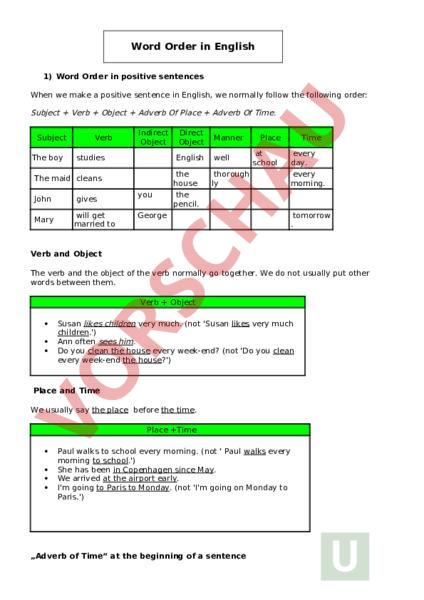Arbeitsblatt: Word order Übersicht
Material-Details
Ein Theorieblatt zur Übersicht der Word Order im Englisch.
Englisch
Grammatik
8. Schuljahr
2 Seiten
Statistik
210962
147
1
30.10.2024
Autor/in
Rebecca Knupp
Land: Schweiz
Registriert vor 2006
Textauszüge aus dem Inhalt:
Word Order in English 1) Word Order in positive sentences When we make positive sentence in English, we normally follow the following order: Subject Verb Object Adverb Of Place Adverb Of Time. Subject The boy Verb Indirect Object studies English The maid cleans John Mary gives will get married to Direct Object you the house the pencil. Manner well Place at school thorough ly Time every day. every morning. George tomorrow Verb and Object The verb and the object of the verb normally go together. We do not usually put other words between them. Verb Object Susan likes children very much. (not Susan likes very much children.) Ann often sees him. Do you clean the house every week-end? (not Do you clean every week-end the house?) Place and Time We usually say the place before the time. Place Time Paul walks to school every morning. (not Paul walks every morning to school.) She has been in Copenhagen since May. We arrived at the airport early. Im going to Paris to Monday. (not Im going on Monday to Paris.) „Adverb of Time at the beginning of sentence We can put the time at the beginning of the sentence. On Sunday Im going to Paris. Every morning Paul walks to school. Note that you cannot use early or late at the beginning of the sentence in this way. Adverbs before verbs: lot of adverbs are put before verbs. always also sometimes possibly probably often seldom never hardly ever almost still definitely certainly even only Let see the following sentences. 1. 2. 3. 4. Paul always walks to school. also walk to school. He often asks me to go together. We never go to school by car. 2) Word Order in questions In questions, the word order subject-verbs-object is the same as in positive sentences. The only thing thats different is that you usually have to put the auxiliary verb (or the main verb be) before the subject. Interrogatives are put at the beginning of the sentences: Interrogati Auxiliary ve Verb What When would Subject you Did you were you Other verb(s) Indirect Object like to tell me? have Direct Object party Place Time at your yesterday? school here? Practice Word order online on:
